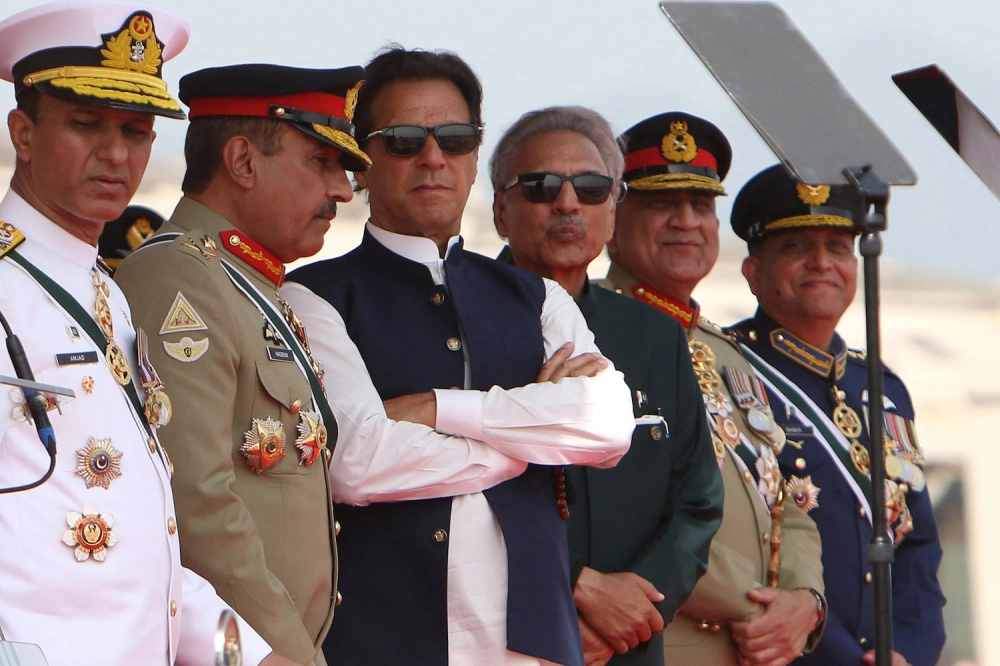Mudassar Changwani
There are well-founded reasons that the Pakistanis are worried about their future and prosperity. The state apparatus that would once boast a sense of normalcy, though very minute in magnitude, is gone. Institutions are fragmented and working against their wishes and wellbeing. At the face value the law exists to ensure that individuals’ rights and dignity are protected; in reality, the law does little to address chronic malfunctioning in the society – as a consequence of which there is almost always an acute want of order, justice, and freedom.
The people of Pakistan hardly ever have fondness or desire for populism – the malice which is, unfortunately, as a result of ceaseless military interventions and economic decadence, creeping deep across the country and institutions. The rise of populism has unrivaled many hard gained benefits of democracy and dialogue. Clearly departing its ways with the previous military-led government, the 2008 coalition government led by former President Asif Ali Zardari placed mutual dialogue and negotiations at the centre of policymaking attempts. Resultantly, the government succeeded in passing key resolutions, bills, and amendments (especially the 18th), ultimately giving democratic functioning a much-needed space to anchor its foot.
Certainly the government failed to deliver on many economic, political and social goals the cost of which it paid in terms of general erosion of people’s confidence in the PPP government.
In the following general election of 2013, the PML-N rose to power by successfully cashing in on people’s feelings of disillusionment since the country was presenting a spectacle of mayhem – rising economic depravity, state malfunctioning, excessive power shortages and terror incidents are but a few examples. Choosing to set aside the feelings of resentment against the establishment – since the previous PML-N government was overthrown by a military dictator, Nawaz Sharif, the party head, promised to start the government on platform of good governance and mutual dialogue. The ensuing years would be among the most exciting in the history of the country. In many areas of common interest and public value, the PML-N succeeded in bending the state apparatus towards progressive ends. The government introduced reforms to upgrade industry, promote agriculture, address power shortages and eliminate terrorist outfits.
Despite establishing successes in economic and development sectors, the real test of the government still remain in handling the unending military involvement in civilian and constitutional affairs. In order to contain the PML-N government, the military put into utility every means – directly or indirectly coming into conflict with the government, propping up anti-PML-N voices, and co-opting and, if necessary, arm twisting the judiciary, the military accomplished its goal of i) weakening the PML-N government to a lower influence and finally ii) ousting it from the power.
In a rally to bring in a political setup which is anti-PML-N in posture as well as bows before the might of hybrid reality, the establishment handed the helm of affairs over to the Imran Khan-led PTI. But this was not the only major change occurring at the time: the country witnessed a growing dislike of military involvement to a scale the like of which had never been seen before. For reasons obvious, the PML-N voters took the lead.
The king is dead; long live the king! Hail to the COAS The link might help the argument.
In three and a half years, following the 2018 general elections, the military-led tide in support of the PTI government has shifted. A political party whose aim was to root out corruption and economic depravity, the PTI fell victim to its leaders’ incompetence, corrupt practices and want of governance delivery. As the mood of the general population grew very much to elevated hostility to the government, the spectacle at the foreign front, among foreign powers and allies, was that of discomfort and mistrust. All these factors cumulatively pointing out towards one thing: that the time has come for the country to see another political intervention. Marked by regressive policy blunders and careless U-turns, as the spring season in the country culminated, giving way to a hotter than usual month of April, Imran Khan was shown the door through a parliamentary procedure – the Vote of No Confidence.
It was projected that the PTI has lost the constitution and the parliament; that among the people the party is wasted; that if only Imran Khan could recapture his lost stature. While most political parties would have been crushed given that they have lost their prime support base – the establishment, Imran Khan manages to come back with a resounding presence on the country’s political horizon. In a political system where perception precedes reality, the PTI finds digital realm to be a powerful tool to paint its political opponents and the establishment as traitors and supporters of foreign interferences and interventions. The idea that only Imran Khan represents the people has greatly helped the PTI in casting doubts over the legitimacy of otherwise completely legitimate VoNC.
The stage for populism is now set. The issue of rising wealth inequalities has already taken the country into its grip. Also, perhaps more real than it is perceived, coupled with the challenge of inequality is the pervasive sense of incomes being stagnant and sluggish. Mix these dark feelings among the voters with the political grievances, now arising out of what is conveniently believed as unfair removal of Imran Khan, a perfect storm of political unrest and populism culminates into its climax, influentially dividing the top social tier, among the party’s centers of influence, into pure PTI leadership against everything that is evil (the corrupt elite. Resultantly, the PTI emerges as the guardian of its voter’s faith, freedom, and rights as well as a stronghold against tyranny, corruption, and evils.
To be continued.
The writer is co-editor at Republicpolicy
Another useful article on related subject. https://foreignpolicy.com/2022/11/04/pakistan-military-imran-khan-assassination/
















